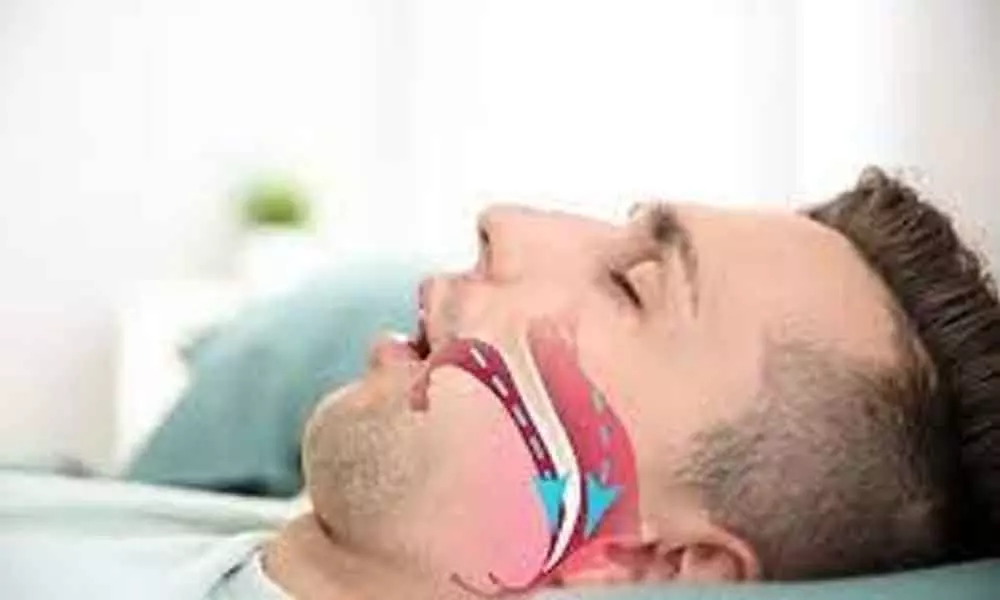Live
- Public Participation Key to Strengthening Democracy-Annamalai
- MLA Anirudh Reddy gets threat letter from Maoist
- "Awareness Program on Road Safety for Auto Drivers Held in Aija Town".
- MLA Bandla Krishna Mohan Reddy Inaugurates NPL Season-4 Cricket Tournament in Netivanipalli
- Rangoli Competitions Showcase Tradition and Creativity in Gadwal.
- "Vadde Obanna: A Revolutionary Hero’s Legacy Celebrated on His 218th Birth Anniversary".
- District Administration Accelerates Implementation of Welfare Schemes.
- Illegal Transportation of Gravel and Soil in Sankalmaddi Village Raises Concerns
- Weavers Celebrate Telangana CM Revanth Reddy’s Welfare Initiatives with Milk Ablution in Aiza.
- MLA Couple Attends Oath-Taking Ceremony of New Governing Body at Shri Shri Jamulamma Parashurama temple in Jammi chedu.
Just In
Healthy lifestyle essential for managing obstructive sleep apnoea: Doctors


Representational Image
Obstructive sleep apnoea (OSA) has become the subject of much discussion after doctors cited OSA as the cause of death for 69-year-old veteran singer-composer Bappi Lahiri, who was suffering multiple health problems. He died at a private hospital in Mumbai on February 15.
Bengaluru: Obstructive sleep apnoea (OSA) has become the subject of much discussion after doctors cited OSA as the cause of death for 69-year-old veteran singer-composer Bappi Lahiri, who was suffering multiple health problems. He died at a private hospital in Mumbai on February 15.
Speaking to The Hans India, The HOD and Consultant - Pulmonology, Lung Transplant Physician, Manipal Hospital, Old Airport Road, Dr. Satyanarayana Mysore said, "Obstructive sleep apnea (OSA) is a common breathing problem. The breathing in such patients stops and starts repeatedly. The condition may cause a drop in the oxygen level in organs and cause abnormal heart rhythm. These patients may have high blood pressure and alterations in cholesterol and blood sugar parameters. Patients with severe OSA are at high risk for heart failure, coronary artery disease, and strokes. OSA patients with underlying heart disease may have sudden death due to multiple episodes of abnormal heart rhythm. The condition is caused due to too much relaxation of muscles at the back of the throat that narrows or completely blocks the airway for around 10 seconds."
"It significantly affects the quality of life, leading to reduced focus, morning headache, insomnia, excessive daytime sleepiness, and irritability. Diagnosis of this condition is made through several tests, such as nocturnal polysomnography. Treatment depends upon the severity of the condition and may include medication for treating underlying conditions, therapies and surgeries. A healthy lifestyle is essential for managing OSA," Dr Satyanarayana said.
He said, "Obstructive sleep apnea (OSA) is a condition which requires constant intervention in the breathing process during sleep. Breathing in such patients stops for about 10 seconds during sleep and is repeated multiple times. The patients with this condition have loud snoring, sudden awakening during the night due to lack of breathing, dry mouth and headache in the morning, mood changes and irritability. The condition is due to excessive relaxation of muscles that assists in breathing. Excessive relaxation narrows the throat resulting in breathlessness. The patient suddenly awakens during the night. However, it is momentarily, and the person does not remember it. If not diagnosed and managed early, OSA may result in several complications, including dry eye, glaucoma, high blood pressure, diabetes, abnormal cholesterol levels, and gestational diabetes."
He added, Studies have reported that patients with OSA are at a two-fold increased risk for sudden death than people who do not have a sleep disorder. Once diagnosed, the doctor treats the patient according to the severity and underlying cause. The therapies for OSA include positive airway pressure machines and oral devices. Patients who are not benefitted with non-invasive treatment may be recommended surgeries to remove the obstruction. Careful selection of patients is of paramount importance for surgical approach. Mandibular advancement splint is offered in select patients as an alternative.
The Senior ENT Surgeon, Kamineni Hospitals, Dr. Chandramohan said, "OSA is a global disease with a rising incidence associated with comorbidities.
besity has strong corelation with OSA, and in obese people due to increased fat deposition in the throat, the upper airway narrowing shall occur along with decreased muscle activity which leads to multiple hypoxic and apneic episodes through the sleep.
The decreased oxygenation ultimately is a contributory factor to hypertension and cardiovascular diseases."
In India the incidence of OSA is about 3-17% , with male affected more than females among an age group of around 30 -50 years. The most common risk factors include obesity, DM2, hypercholestemia, hypertension, depression.
He said, "Luckily, we can treat OSA with surgical and non-surgical techniques which include weight reduction, reducing BP and anxiety and those who cannot be treated medically can be treated surgically. OSA is an important health crisis that demands multi layered intervention which if diagnosed early can be treated, and can improve the overall health of the individual."

© 2025 Hyderabad Media House Limited/The Hans India. All rights reserved. Powered by hocalwire.com






